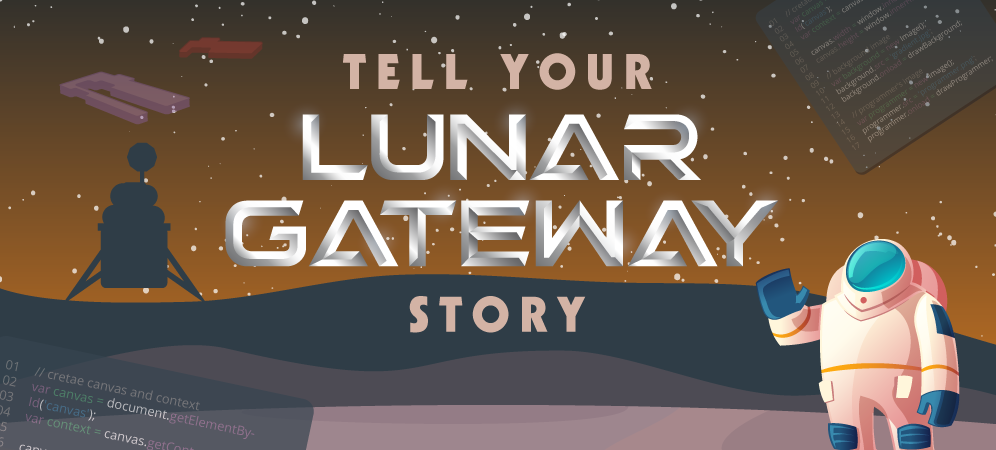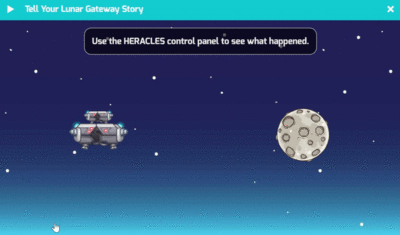
Table of Contents
Moon 2 Mars Part II – The Lunar Gateway Coding Challenge
Calling all educators, parents, and students: The Tynker team is excited to bring you the second in a series of coding challenges inspired by NASA space missions! In the first challenge, Design a Mission Patch, students imagined that they were about to embark on a journey to the moon and created their very own Mission Patches to represent their mission.
Now, just in time for World Space Week (October 4-10, 2019), they are invited to imagine that they have embarked on their space journey, as Artemis astronauts at the Lunar Gateway. The new challenge will go live on Sunday, September 29th at 12:00 noon Pacific Time and close on Sunday, October 13th at 11:59 pm Pacific Time.
As with the previous coding challenge, kids will have the opportunity to submit their projects for a chance to win a live video chat with a NASA expert. Read on to learn more about this exciting project and how students can participate!
NASA’s Artemis Program and the Lunar Gateway
NASA is on a mission to return humans to the moon as part of their initiative to go Forward to the Moon and on to Mars! NASA’s Artemis program is their plan to land the first woman and next man on the moon by 2024. In 1969, when astronauts first walked on the moon, the NASA mission that brought them there was called Apollo. In Greek mythology, Artemis is Apollo’s twin sister and goddess of the Moon. As part of the Artemis program, astronauts will not only explore the Moon but will also visit the Moon’s South Pole, where no human has been before.
Artemis is part of NASA’s overall plan to set up a long-term human presence on the Moon by 2028. The goal is to not just visit the Moon, but to stay there, and to use what astronauts discover to fuel further technological advancement on Earth. As part of this mission, astronauts will live on the Lunar Gateway, a spaceship that will orbit the moon, as they prepare for further exploration. This spaceship will have living space for the astronauts, a research lab, and more.
Tell Your Lunar Gateway Story Challenge

In this exciting second coding challenge from Tynker inspired by NASA space missions, students will imagine what life would be like as an astronaut on the Lunar Gateway! As they perform research for their project, students will explore thought-provoking questions about what they could do as astronauts on the Lunar Gateway, such as: “Will you be conducting any robotic missions?” and “What technologies need to be developed and proven to establish a sustainable presence on the Moon?” Then they’ll use coding concepts like delays, loops, and input/output to make a truly unique story project. This is a great opportunity for kids to both learn about space exploration and develop their programming and storytelling skills!
How to Participate
Help students get excited about the Artemis program as they make their own story projects! The challenge is designed for all students from Kindergarten till 12th grade. The Tell Your Lunar Gateway Story project is available as both a Tynker Blocks project for K-5 students and a JavaScript project for older students, so students of different coding skill levels can participate. Tynker has created lesson plans for both languages and both will be available on the teacher dashboard to guide teachers through every step of the project!
Creating their own stories about life on the Lunar Gateway is pretty exciting for students, but it doesn’t stop there! Just as with our previous challenge, Design a Mission Patch, students will have the opportunity to enter their projects for a chance to win a class video chat with a NASA expert! As part of the last challenge, five students from around the world won a video chat for their classroom, and they learned valuable information from the NASA experts, such as what it’s like working at NASA and how humans survive in space.
Encourage students to be the next to win a video chat with a NASA expert by submitting their completed projects. Have students publish their projects on Tynker between Sunday, September 29th at 12:00 noon Pacific Time and close on Sunday, October 13th at 11:59 pm Pacific Time. Top projects can be seen at the Tynker Moon 2 Mars Challenge page. Entries will be evaluated on originality, project quality, and use of code. Additionally, JavaScript projects by older students will also be evaluated on the demonstrated understanding of NASA’s Moon 2 Mars initiative, the Lunar Gateway project, and the Artemis program. Winners will be judged and selected jointly by NASA and Tynker.
Help us spread the word! Share the excitement on social channels and invite others to join. Tag @NASA, @NASASTEM, @GoTynker, and @WorldSpaceWeek with hashtags #Tynker, #Artemis, #Moon2Mars, #LunarGateway, or #WorldSpaceWeek.
More Ways to Bring Space Science to Students
Check out these resources to expand space science learning for students!
- Keep an eye out for more Moon 2 Mars coding challenges from Tynker in 2019!
- Check out NASA’s new Forward to the Moon Explorer Activities with fun activities for students ages 5-12.
- Visit the NASA STEM Engagement website to find resources for teachers to help make science exciting and meaningful for your students.
- In Tynker’s Space Quest, a coding puzzle for beginning coders, students help the astronaut find a new spaceship!
- Weave coding curriculum like Tynker’s Physical Science course into your lesson plans, no matter what subject you teach! Students can even create a model of the solar system with Tynker.
- Share inspirational stories about women in space exploration! Sharmila Bhattacharya is a biologist for NASA who studies how humans will react to space conditions, Christina Deoja is an electrical engineer who has worked on the Orion spacecraft, and Margaret Hamilton helped ensure the success of the Apollo 11 mission.




